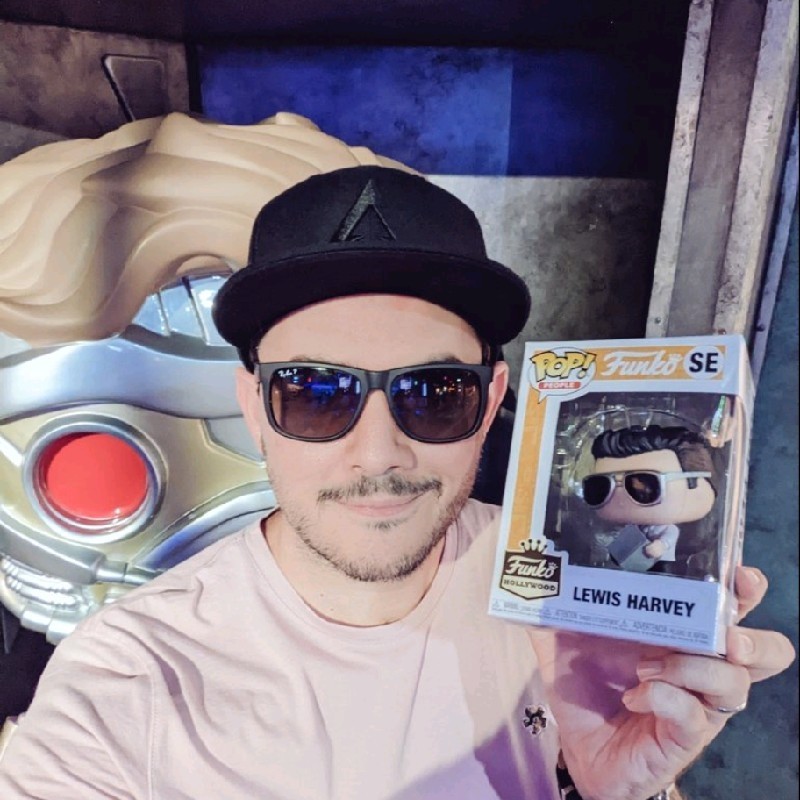Inside Wild Hearts’ troubled launch: high stakes, poor performance, and EA’s push for $70 AAA price point
Wild Hearts has just launched globally. Although Omega Force’s new game is appealing gameplay-wise, its technical state could ruin the studio’s plans to build a new monster hunting franchise. Let’s take a look at the title’s market potential and what made Electronic Arts bet big on it.
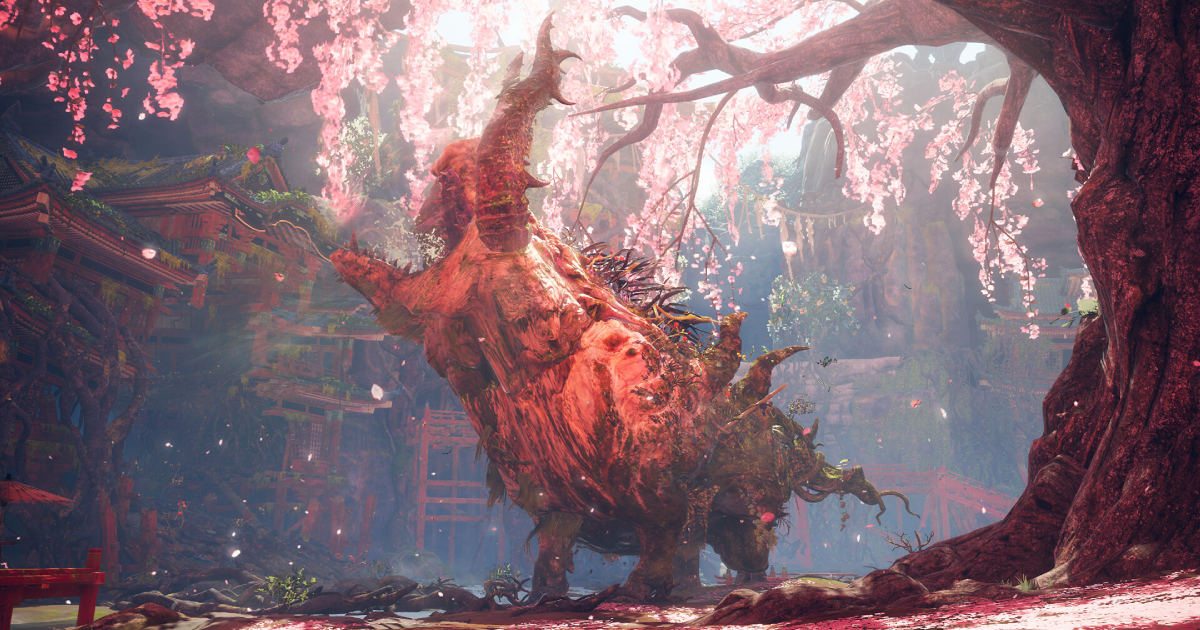
Wild Hearts in 8 bullet points
- After more than four years in production, Wild Hearts came out on February 16 on PC, PlayStation 5, and Xbox Series X|S.
- Developed by Koei Tecmo’s subsidiary Omega Force, the game offers its own spin on the Monster Hunter genre popularized by Capcom’s franchise of the same name.
- The main difference is the Karakuri crafting system, which allows players to build various tools and contraptions like giant bombs, pounders, gliders, and towers.
- Omega Force is best known for its long-running Dynasty Warriors franchise, a series of epic hack and slash games set in Three Kingdoms period and featuring dozens of characters with ultimate Musou attacks.
- With Wild Hearts, the Japanese studio wanted to reach a global audience and “build another pillar” franchise like Dynasty Warriors.
- In this mission, Omega Force partnered with EA Originals and marketed the game as a $70 AAA experience.
- Wild Hearts received positive reviews from critics and peaked at 20,661 concurrent players on Steam.
- However, the launch was marred by technical issues, resulting in a generally negative reaction from players.
Is this Omega Force’s first foray into the Monster Hunter genre?
The quick answer is “no”.
In 2013, Omega Force released Toukiden: The Age of Demons, a monster hunting game for PS Portable and PS Vita. It was followed by the sequel, Toukiden 2, which received good reviews and featured some interesting mechanics, but still remained in the shadow of the Monster Hunter series due to a more arcade-like gameplay.
So the studio had some experience in this genre, wishing this time to bring several innovations into it. As Wild Hearts game director Kotaro Hirata told IGN, Omega Force decided to create a new IP to make the game “appeal to a more global audience than the Toukiden series.”
“This project began as an attempt to create a Japanese-style hunting game that a new generation of players around the world could have fun with,” he said, adding that monsters (Kemono) that players hunt, as well as battle system and the world setting, are what makes Wild Hearts stand out from other titles in the category.
This strategy makes sense given that the genre became popular among Western players after the release of Monster Hunter: World — the first game in the series to generate most of its sales outside of Japan. There is certainly a place in the market for more games like this, especially if they can offer players new mechanics. But Omega Force’s attempt nearly crashed on a series of technical issues combined with a $70 price point.
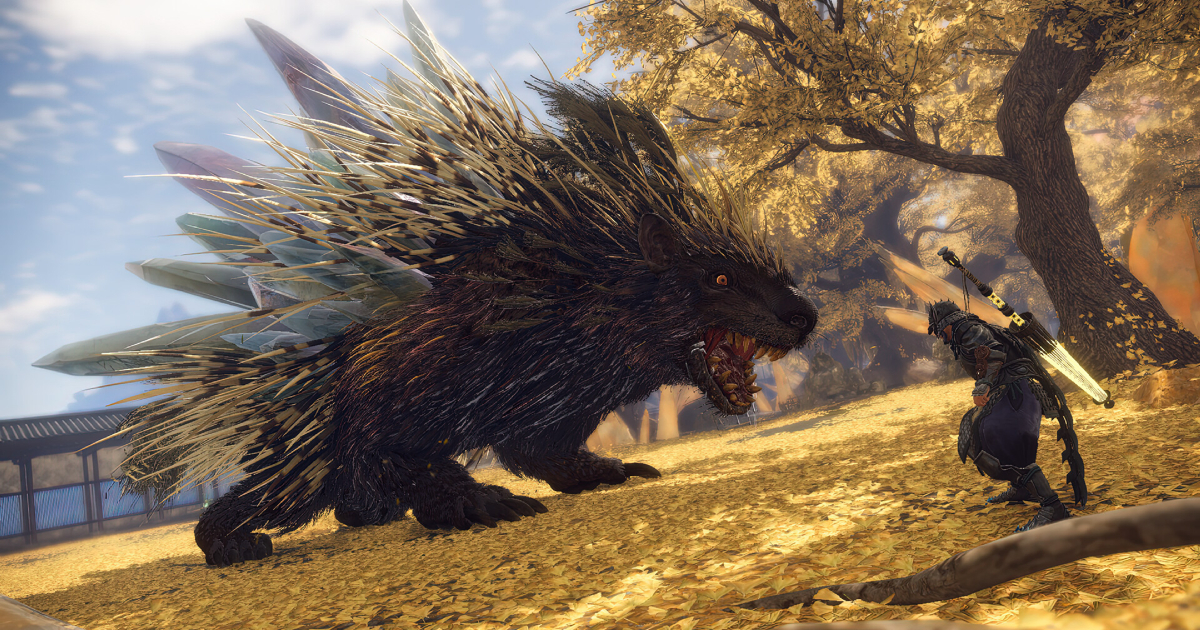
Why does Wild Hearts cost $70 and what made EA believe in its commercial appeal?
The era of $70 games has arrived, with more big companies sticking to that price tag for their new releases. There are many economic and simply logical explanations for this, which we have already heard from publishers. Players don’t like to pay more, but they generally don’t get upset when a new Call of Duty game costs $70 at launch. However, the price of some new releases still raises questions, and Wild Hearts is definitely one of them.
Electronic Arts entered into a partnership with Koei Tecmo last September. The announcement was special for two reasons:
- Wild Hearts was branded as a “truly AAA experience” that was supposed to help the Japanese company expand into global markets and reach new audiences;
- It received support from the EA Originals label, which previously only published smaller indie titles.
Earlier this year, EA Partners general manager Jeff Gamon attributed the changes to the EA Originals program by the company’s desire to support bigger and more innovatie games. The terms of the deal with Koei Tecmo remain undisclosed, but they are probably not as altruistic as for indie games.
Here is what EA CEO Andrew Wilson told investors during the November 2022 earnings call about the game’s pricing and its potential to commercially succeed in today’s market:
We have a long and rich history of co-developing, co-publishing and distributing AAA full-priced IP, all the way back for as long as I can remember. We don't do as much of it anymore just because there's not as much of it out there that we think really fits the bill and is it a AAA quality bar that we believe can deliver against the expectations of these global communities at a full price point. We think Wild Hearts is the one CEO of Electronic Arts
The main thing here is that EA believed that Wild Hearts would hit this “AAA quality bar” to justify its $70 price tag. Wilson even called it “incredible”, saying that the monster hunting genre is “ripe for innovation and creativity and expansion.”
He didn’t directly answer the question about the franchise potential of Wild Hearts, but the whole speech implied that EA was betting big on this game. This is also in line with one of the key pillars of the EA Originals program, which is building long-term partnerships and helping third-party teams release multiple titles.
To sum it up, Electronic Arts is looking for new revenue streams outside of its in-house IPs. So adding new third-party AAA products to its portfolio could contribute to the company’s long-term growth.
The question is, was Wild Hearts the right bet and would it be able to meet the publisher’s expectations sales-wise?
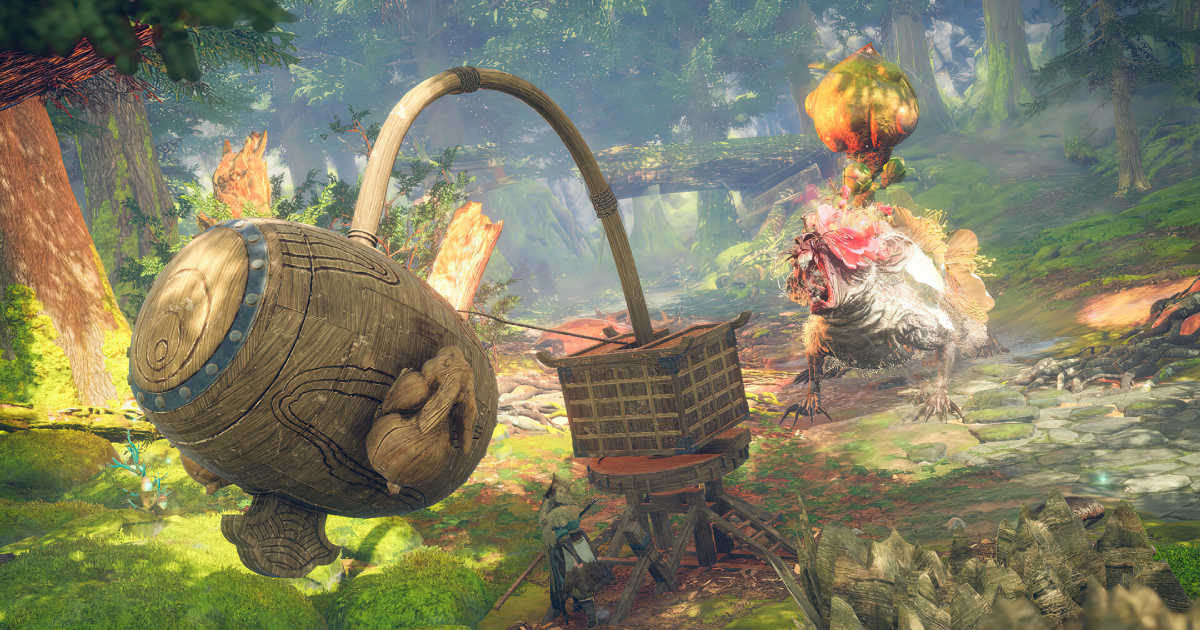
Poor optimization once again results in poor player reception
Technical issues and poor performance (especially on PC) have unfortunately become the scourge of most new big-budget releases. The Callisto Protocol, A Plague Tale Requiem, Hogwarts Legacy, even the next-gen update for The Witcher 3…it is hard to remember a AAA game launched in recent months that didn’t have stuttering, FPS drops, or other problems, even on top-tier systems.
There are exceptions to this rule, but Wild Hearts is definitely not the one.
The game came out to generally favorable reviews from the media, with the PS5 version getting 80/100 on Metacritic. Critics mostly praised the core mechanics and called Wild Hearts a good twist on the monster hunting genre, while also noting some technical issues.
PC players, however, were — to put it mildly — not so generous in their comments. On Steam, Wild Hearts is currently rated “Mostly Negative”, with only 33% of user reviews being positive. The reasons? Here is one comment that sums them all up: “The price is higher than the FPS you will be able to pull in this game.”
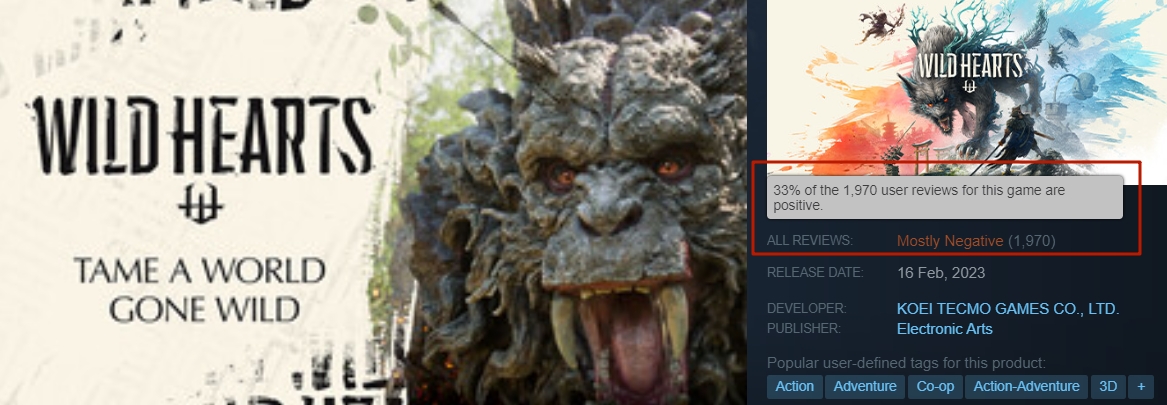
It is clear that the overall score wouldn’t be “red” if it wasn’t for all these performance issues. Even in negative reviews, a lot of players seem to enjoy the combat and gameplay in general. But it is hard to have fun and thumb up a product when you have paid $70 for it and it can’t run properly even on the RTX 30/40 series.
Alexander Battaglia of Digital Foundry also noted that it is time for consumers to speak out against bad game launches: “Refund poor releases, do not play further. Do not accept poor/mediocre!”
I may end up testing this game in time, but everything I am reading tells me this would be a game I would not have a lot of positive things to talk about in a PC review video.
— Alexander Battaglia (@Dachsjaeger) February 15, 2023
The roots of the performance issues seem to lie in the game’s engine. In March 2021, Koei Tecmo trademarked a new proprietary tech called “Katana Engine”, according to Gematsu. Not much is known about it, but here is what EA Originals executive producer Lewis Harvey told Wccftech last year:
Koei Tecmo uses a proprietary engine called the Katana engine. It's an engine in development; as you all well know, building an engine and a game simultaneously can have challenges. I don't believe that raytracing is something that will be supported at the launch of Wild Hearts. But as I mentioned, the engine is an ongoing development, and we hope to see improvements in the future. Executive producer at Electronic Arts
On February 16, Omega Force released a statement on Steam, promising to fix a CPU threading issue, visual artifacts, and some bugs in a patch coming next week. It also should improve overall stability, although the first impression for many players has already been ruined. This is certainly not a good sign, especially for a AAA game that relies heavily on its launch sales.
What does the future hold for Wild Hearts and the EA/Koei Tecmo partnership?
Taking all this information into account, it can be assumed that the botched launch would have a negative impact on sales. Of course, all these issues can be resolved; Wild Hearts may also do well commercially on consoles or show good numbers in Japan. But ambitious plans to add a new AAA hit game to its portfolio (EA) and reach the Western audience (Koei Tecmo) are starting to crumble.
It is too early to say whether Wild Hearts will get a sequel. Even if it does, will it be published by EA Originals?
It all depends on: a) the terms of the partnership between the two companies; b) expectations they had for Wild Hearts in terms of sales; c) the game’s ability to recoup investments (given that we know nothing about its budget).
Perhaps, we will get some answers in one of Electronic Arts’ next financial reports. If Wild Hearts ends up selling well, the company is likely to brag about specific numbers. Otherwise, we will see some vague statements like “The game didn’t perform in line with our expectations.”
As the first AAA game released under the EA Originals label, Wild Hearts is far from a triumph right now. But the company still has some big third-party games in its pipeline that fit in with its strategy to publish bigger projects (e.g. Immortals of Aveum, a magic FPS from former Call of Duty and Dead Space developers).
And as for Koei Tecmo, players can still expect more Musou games in the future, as well as Team Ninja’s new action RPG Wo Long: Fallen Dynasty coming out later this year. The question is whether Omega Force can quickly fix all technical issues and eventually fulfill its mission of turning Wild Hearts into a new pillar franchise.

